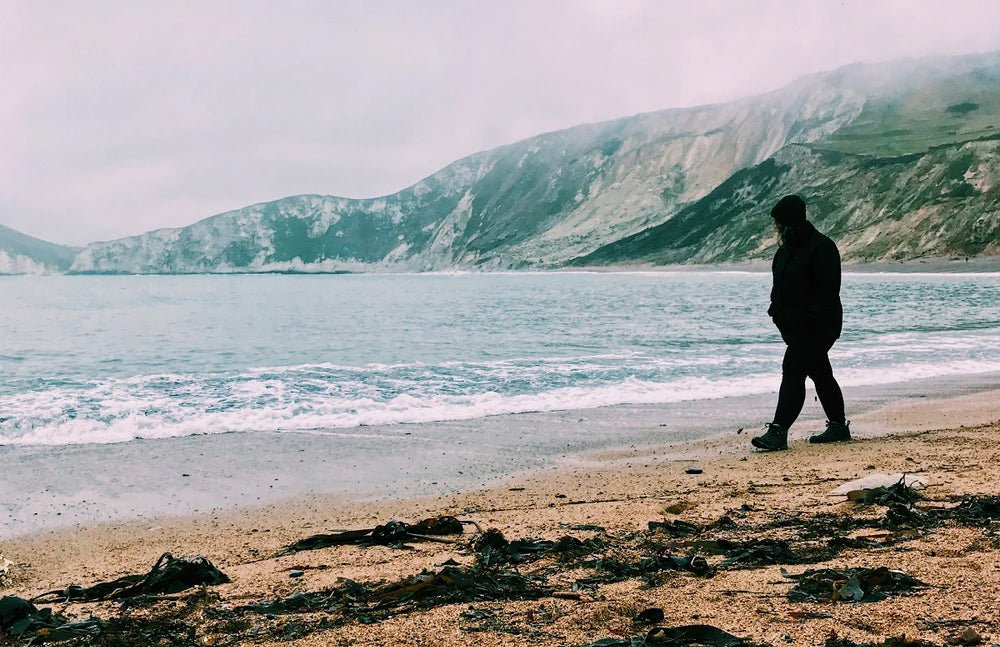Some doorstep miles are longer than others

I was sat on top of a Neolithic tomb when I realised that something was wrong. We’d spent the week surveying rockpools on the west coast of Guernsey, hunting for invasive species amongst dulces and kelps. From the wine-coloured richness of the water to the rocky shards that rise from the yellow sand, Guernsey seems perpetually caught in golden hour during the summer months.
The day I arrived on the island was still and the mid-afternoon sun cast a quiet hum over everything that turned the senses inwards; the ringing of breath in the ears and the throb of blood under the skin was most tangible feeling. We journeyed to L’Eree that first evening and spent an hour bathing with the gobies, cocooned by granite hands and hidden from view while the cormorants headed out to the sea beyond Lihou.

Enchanted by the memory of that first evening, we searched for the very same rockpool on our day off. The heat had become oppressive as the week continued and now it pulsed from the concrete through my shoes as we wound our way to L’Eree point. The grassy banks that hid the houses barely moved, not a shudder or a ripple, and though the sea was just over the hill only the taste of the salt on my lips told me we were close; the island was silent.

My body was heavy in the heat, the effort of moving one foot after another took me backwards rather than forwards. I was overheating, my cheeks were prickled numb and my breath coursed roughly from my feet to the tips of my ears. All the joints in my legs had disappeared, replaced by grinding rocks that sent tremors to my ribcage.
When the tears came I could barely feel them, I wasn’t in my body anymore. I wasn’t observing it either, there was just nothing.
Le Creux ès Faïes tomb was the perfect resting place; a mound of cool grass and stone, shaded by trees and endless history to distract me. Sat there, above the bay and listening to folklore about a fae kingdom, I wondered if those who had travelled through the dolmens and into the fairy world thought I was being pathetic, or if they too had unexplainable pain back in 3000 BC.

An early ferry took me home and to the door of the doctor’s surgery, half a dozen of whom I’d already seen. This time, the usually talkative doctor looked me over silently, leant back in his chair and in a tone that said, “you’ve spent enough time in my office”, diagnosed me with fibromyalgia.
Fibromyalgia syndrome causes widespread, unexplainable pain throughout the body. Small knocks that come with daily life hurt for hours, as though someone is digging their fingers into a bruise and won’t let go. It causes the inability to fall asleep and stay there, leaving you exhausted. If exhaustion hasn’t already set in, easy to moderate activity can leave you bed bound. It’s chronic. Irritable bowel syndrome, chronic fatigue, ME, anxiety and depression are its associates, and above all, fibromyalgia’s primary side effects are guilt and worry.

Days anticipating what wonders that lie ahead, straying from the path to follow the curious and curiouser. Car journeys where the hours roll into one another, time forgotten as awe feeds adventures. All these days of get up and go replaced with seeping shame and burdensome apprehension. How long will our adventure take, are there stopping points, can I do it?
The primary side effects are guilt and worry
Fibromyalgia isn’t a visible problem and those of us who have it will live. But this outward presenting normalcy feeds an inward seed of shame. Why can’t I go on great adventures, up mountains, over oceans and along rivers? You’ll look childish if you get upset. Don’t slow the others down. How can you possibly call yourself “outdoorsy”?
Some days, remembering that the body doesn’t work quite as it should can be more debilitating than the days when the pain wears you down. How on earth do we reconcile living a curious and outdoor life with illness and disability?
Well, take a look around. With the encroachment of urbanisation, gulls took to the rooftops to build their nests and urban fox numbers are increasing as industrial expansion generates more food and shelter. Their landscape changed, so they did the same. They adapted to survive.

In February I found myself alone in Edinburgh for a few days. It was a warmer than expected, and from my window I could see Arthur’s Seat, golden in the low winter light. Reaching the top would take the best part of the day’s limited sunlight but it was a piece of treasure that I could grasp if I set my mind to it. Overwhelming joy replaced fear and worry when I took my last steps up to the peak. I had achieved my goal alongside chronic illness, not despite it. While overlooking the city below I wrote in my diary “I determined to do it”.
Overwhelming joy replaced fear and worry.
Now I know that we can determine to do it, we just have to adapt.
Create manageable goals. See the world just outside the window. Look down. Look up. Look sideways. There’s always something wild to see.
Many places have accessibility schemes. You can hire motorised wheelchairs or go on guided routes designed for those with mobility problems.Forgo difficult activities for easier tasks; take an identification guide to one particular spot and get to know the world around you.
Open the window on the days it’s impossible to do anything. What can you hear? Even in the city there may be the call of a fox or the chatter of a magpie.
If your mindset is holding you back, an understanding works wonders. Tell them you’re struggling and modify what you have planned to something you feel able to do and that will make you feel great.

